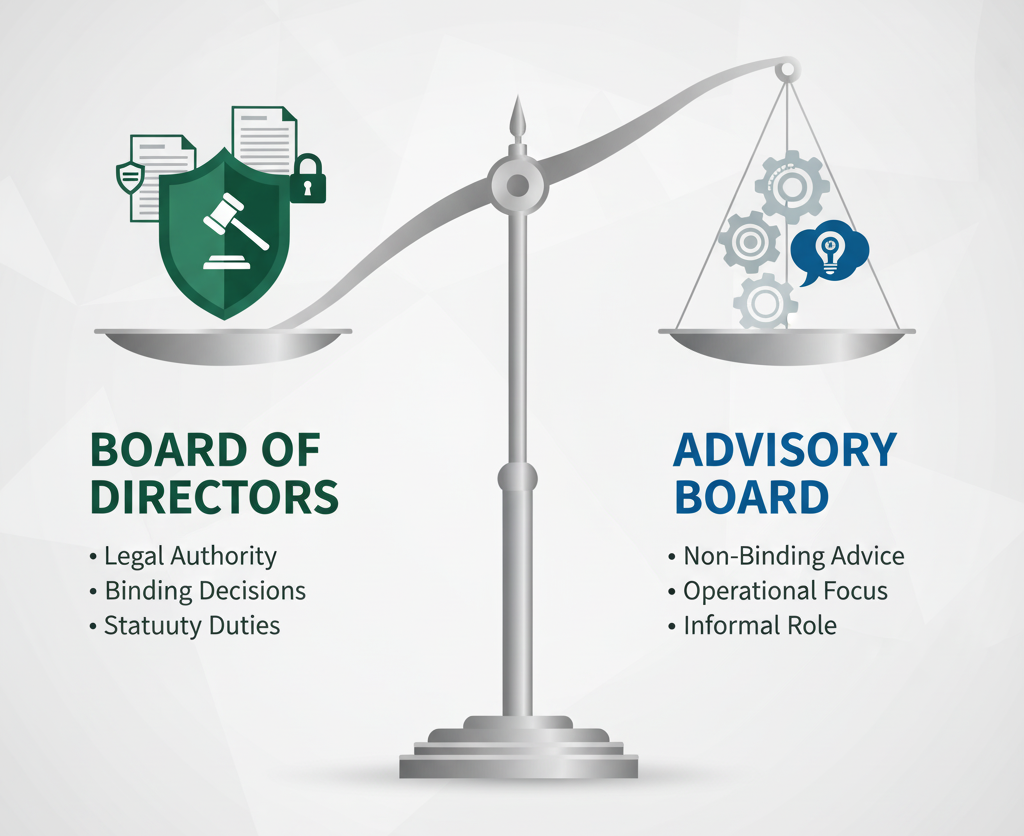In the world of business governance, boards play a crucial role in guiding the direction and success of a company. However, not all boards serve the same purpose or hold the same authority. Understanding the distinction between an advisory board and a board of directors is essential for business leaders to make informed decisions about governance structures. This blog explores the key differences between these two types of boards and why choosing the right one matters for your business.
What is a Board of Directors?

A board of directors is a formal governing body responsible for overseeing a company’s management and ensuring that it operates in compliance with laws and shareholder interests. Members of the board hold legal responsibilities and fiduciary duties, meaning they must act in the best interests of the company and its stakeholders.
Typically, a board of directors consists of executives, independent directors, and industry experts who bring diverse skills to the table. They meet regularly—often monthly or quarterly—to review company performance, approve budgets, and set strategic direction. Their key functions include approving high-level strategies, overseeing financial health, and evaluating executive leadership such as the CEO.
What is an Advisory Board?

In contrast, an advisory board is an informal group that provides expert advice and practical insights without the legal authority or fiduciary responsibilities of a board of directors. The advisory board’s primary role is to support the company by offering specialised knowledge and hands-on guidance for specific challenges.
Advisory boards are generally smaller and more flexible, composed of industry experts, entrepreneurs, and specialists selected for their unique skills relevant to the company’s needs. They meet less frequently and focus on providing strategic support, problem-solving, and innovation. Unlike directors, advisory board members do not have voting rights or formal decision-making power.
Key Differences Between Advisory Board and Board of Directors

| Aspect | Board of Directors | Advisory Board |
| Legal Authority | Has legal decision-making authority | No legal authority, advisory only |
| Fiduciary Duty | Members have fiduciary responsibilities | No fiduciary duties or legal liabilities |
| Decision-Making Power | Makes binding decisions | Provides recommendations, no voting rights |
| Role Focus | Governance, compliance, strategic oversight | Specific challenges, operational advice |
| Meeting Frequency | Regular, formal meetings | Flexible, as-needed meetings |
| Accountability | Accountable to shareholders and stakeholders | Accountable to CEO or management only |
| Operational Involvement | High-level oversight, not daily operations | Involved in day-to-day challenges |
When to Choose an Advisory Board

Advisory boards are ideal for startups or growing businesses looking to scale, innovate, or fill expertise gaps without the complexities of formal governance. They offer valuable flexibility and allow companies to access experienced professionals without imposing legal obligations on members.
Situations where an advisory board can be particularly beneficial include:
- Expanding into new markets or launching new products
- Navigating challenging industry conditions or competition
- Raising credibility with investors and stakeholders
- Supplementing internal expertise in areas like marketing, technology, or operations
Also Check: Top Benefits Of Change Advisory Board (CAB)
When to Choose a Board of Directors

For companies—especially public corporations—a board of directors is often a legal requirement and vital for ensuring governance, compliance, and accountability. Boards of directors carry the responsibility of safeguarding shareholder interests, monitoring financial performance, and steering the company’s long-term strategy.
A board of directors is essential when your business requires:
- Formal oversight and legal accountability
- Strategic decision-making authority
- Performance evaluation of senior executives
- Compliance with regulatory requirements and risk management
How Advisory Boards and Boards of Directors Can Work Together
Both advisory boards and boards of directors bring unique strengths to a business. While directors handle governance, compliance, and major strategic decisions, advisory boards provide specialised, practical advice on specific issues or opportunities.
Collaboration between the two can enhance leadership effectiveness by integrating expert insights with formal oversight. Open communication and shared goals between advisory members and directors enable more informed decision-making and stronger risk management, ultimately driving sustainable growth.
Conclusion
Understanding the key differences between an advisory board and a board of directors is crucial for building a strong governance structure tailored to your company’s needs. Boards of directors focus on legal responsibilities, governance, and high-level strategy, while advisory boards offer flexible, specialised advice and hands-on support.
Choosing the right type of board—or combining both—can empower your business to innovate confidently, manage risks effectively, and achieve long-term success.
For businesses ready to enhance leadership with skilled advisors or directors, thoughtful selection and clear role definition are the first steps toward growth.

